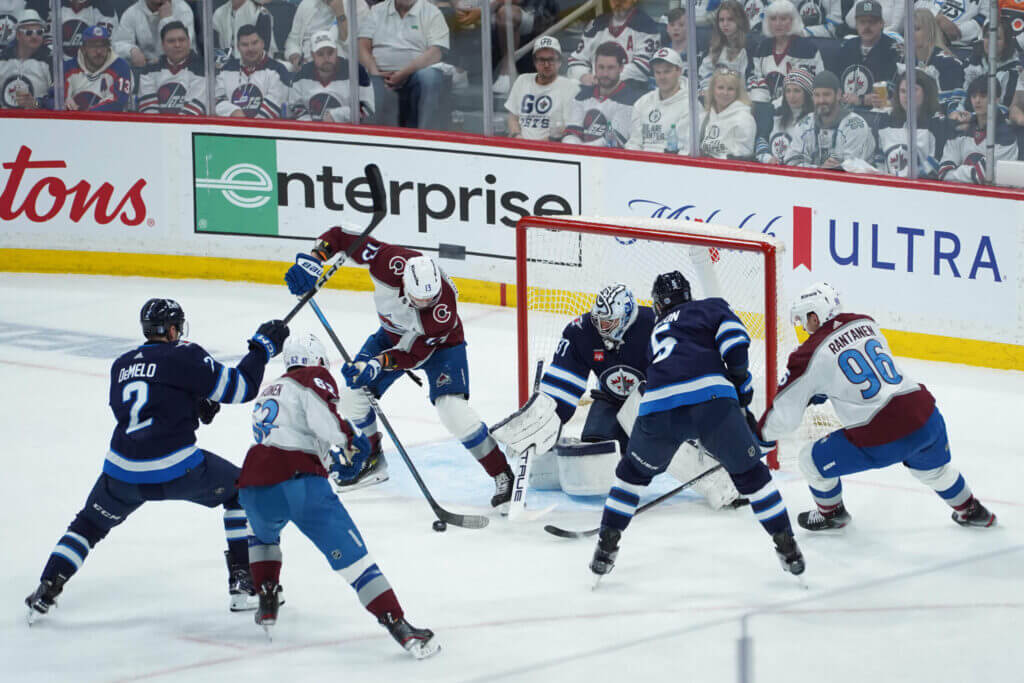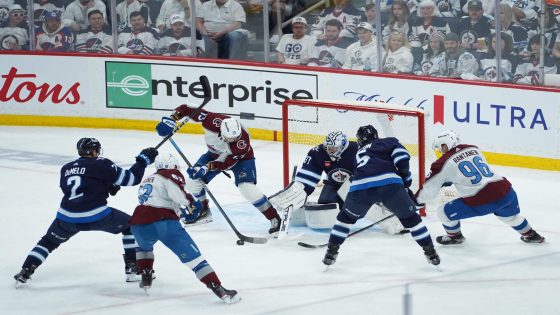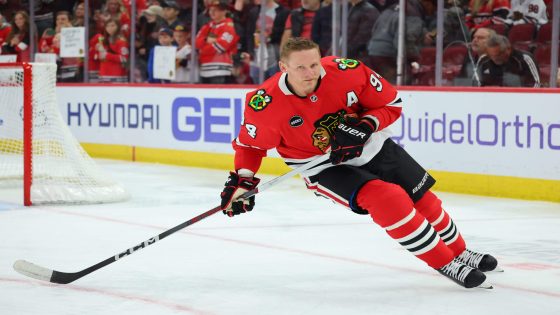
The Winnipeg Jets wrote themselves a perfect script.
Block the shots. Get the clears. Kill Kyle Connor’s four-minute high-sticking penalty. Watch as Connor comes out of the penalty box as if shot out of a cannon, then passes to Gabriel Vilardi whose centring feed sparks one-handed genius in Mark Scheifele for a game-breaking 2-1 goal.
That was it. That was the moment partway through the second period Winnipeg put a 2-0 series lead within its grasp.
Then Avalanche coach Jared Bednar and his trio of superstars took it away. Nathan MacKinnon was double-shifted throughout the second period, rolling his way through Jets defenders until Bednar had the matchups he wanted. MacKinnon, Mikko Rantanen and Valeri Nichushkin all played over nine minutes in that middle frame, kick-starting Artturi Lehkonen’s game-tying goal on a minute-long shift. The goal ended MacKinnon’s sixth shift of at least one minute in the period.
Bednar took MacKinnon off the ice for a whole minute and a half after that before putting him right back out there, darting behind Logan Stanley on a play that could have become the game-winning goal. The Jets escaped the moment but soon it became clear: The Avalanche weren’t alone in orchestrating Colorado’s comeback. Lehkonen’s goal had been a deft deflection after multiple waves of attack, but Zach Parise’s game-winning goal came with 2:40 left in the second period and was a play Winnipeg had all the power to stop.
Connor Hellebuyck had been sensational in the first period and good to start the second. He’s the best goaltender in the series and was the better of the two goalies in Winnipeg’s Game 1 win. There had been “Helly! Helly! Helly!” chants reverberating through Canada Life Centre before the anthems were sung and again after making five massive saves on Colorado’s first-period power play.
Then Hellebuyck made a misplay that might remind Jets fans of giveaways of playoff nightmares gone by. He’d left his net to knock down a Colorado dump-in to his right, looked up to see Yakov Trenin barrelling in on him, and then fanned on his escape-hatch pass to Brenden Dillon. He had the presence of mind to box Trenin out of the play as the puck sat beside his vacated net, but Neal Pionk swatted it to Andrew Cogliano behind the net. Cogliano centred, Zach Parise shot and Hellebuyck made the first save — a desperate, diving effort off his helmet — but was beaten on the rebound.
Parise really said, “That puck is going #ALLIN” 👀#GoAvsGo pic.twitter.com/DZj08XgwOQ
— x – Colorado Avalanche (@Avalanche) April 24, 2024
I think Pionk’s role in the giveaway absolves the goaltender a little but that whole play needs to be made faster, cleaner and with more support. It’s the kind of goal that can determine a playoff game.
“I think we did a good job of realizing that’s a fluky one,” Connor said. “How many times does (Hellebuyck) go back and play the puck and it’s bang up, no problem. Our forwards can do a bit better job picking the forwards coming in, too. Maybe a little skate screen can help him out. It’s a team effort there, but at the same time, I think that’s one of those you just brush off. You know you’re playing good at that point. Hopefully you follow up on the next shift.”
The perfect Colorado storm did not end there.
Two minutes after Parise’s goal, Nikolaj Ehlers tried to spin off Nichushkin at four-on-four just as Gabriel Vilardi and Josh Manson’s penalties came to an end. Sean Monahan went off for a line change as Ehlers fished for the puck along the boards. Ehlers is meant to be a deadly weapon at four-on-four, using his speed to take over the game, exploiting open ice to make opponents pay. But MacKinnon stepped in and fired a breakaway pass to Manson for Colorado’s fourth goal.
Josh Manson on the breakaway! #GoAvsGo | #ALLIN pic.twitter.com/mfLixORprP
— x – Colorado Avalanche (@Avalanche) April 24, 2024
In the first or third period, Ehlers’ giveaway, Monahan’s line change and MacKinnon’s stretch pass wouldn’t have been a problem. In the second period, however, Manson’s penalty box is closer to Hellebuyck’s net than Vilardi’s, and MacKinnon’s pass became a breakaway. What golden script the Jets had written, what opportunity for glory they’d gathered in Scheifele’s one-handed goal had evaporated in five minutes and 37 seconds of play.
And that is how the Jets let Game 2 slip away.
“We didn’t forget about (Manson) but it’s just we turned the puck over,” Rick Bowness said. “We lost the battle on the boards. It’s just the timing of it. He’s on that side of the ice so you can’t give him the puck, you can’t catch him. It was just unfortunate timing and they took advantage of it.”
The Jets pushed back in the third period but it wasn’t enough.
Josh Morrissey was able to dance along the offensive blue line effectively for most of the third period. Connor, Scheifele and Vilardi played big, desperate minutes looking for the tie. There was a five-on-five play in which Joel Kiviranta blocked a Dylan DeMelo shot after traffic in front of the net had taken Alexandar Georgiev right out of the play and a four-on-four deflection by Adam Lowry that bounced just wide.
Ehlers got a Grade-A chance from a Nino Niederreiter pass as a Jets power play expired but Georgiev got his blocker on it. Ehlers skated off, dejected. Then, with five minutes to go in the game, an Avalanche dump-in bounced awkwardly off of Hellebuyck into the corner; it seemed for a moment like there had been a reversal of fortunes in each team’s goal. Canada Life Centre’s mock cheers of Georgiev’s first save or the loud, lengthy “Georgiev!” chants didn’t seem to bother him anymore.
It helped that Colorado did such a good job stopping Winnipeg from chaining together consecutive offensive zone shifts, particularly in the third period when Georgiev stopped all eight shots he faced.
Connor, who hit a post shortly before Lehkonen’s goal, saw it as a big story in the 5-2 loss.
“We could have done a lot better job of developing some offence in their zone and getting some more zone time,” Connor said. “I thought we were a little bit too quick to one and out. Get the puck in, maybe (go) low to high, (get) one shot and then they transitioned.”
Winnipeg had entered Game 2 believing it could do a better job of limiting Colorado in transition. Bowness had talked about the Jets spending an uncharacteristic six and a half minutes of time in their own zone in Game 1, allowing the Avalanche to turn their elite transition game into sustained pressure.
The Jets started Game 2 so much better than that before finishing the night with a loss. David Gustafsson opened the scoring 3:15 into the game on Winnipeg’s third shot of the night. The Jets continued to press, earning one power play and then getting a second one before Niederreiter’s hooking penalty negated it. The five-save PK was all Hellebuyck, with Colorado taking control of the game.
That’s why the four-minute kill of Connor’s high-sticking penalty had been such an enormous momentum swing. Colorado scored on both of its power plays in Game 1, looking appropriately dominant for a unit that finished the regular season ranked fifth in the NHL. Winnipeg’s all-out scramble to survive that PK would have been the stuff of long-term Jets lore — if the Jets had won the game.
Alex Iafallo was everywhere. Dylan Samberg blocked multiple shots. Dylan DeMelo, Neal Pionk and Brenden Dillon threw body checks. Adam Lowry and Sean Monahan got massive clears, killing precious time by taking the puck down the ice. Mason Appleton and Vladislav Namestnikov got into shooting lanes and kept the Avalanche at bay.
For that desperation to turn into a 2-1 Jets lead? That was Winnipeg’s opportunity to push Colorado out of their building.
The precision of the pass 🤌 pic.twitter.com/dRi4c6gYIi
— Winnipeg Jets (@NHLJets) April 24, 2024
Now the Avalanche get to talk about resilience as the Jets focus on their adjustments for Friday’s Game 3.
“When you come into the playoffs, you have to be resilient,” Manson said. “There are going to be roller coasters, ups-and-downs and with that win in 2022, that was a big focus of ours. Not letting frustration set in, whatever it may be. Just being that resilient, callous brain, where you just keep pushing forward and sticking to your game plan and the results will come. We have a few guys in our room that have been there — and we’ve got more guys that have been in the same situation on other teams in the playoffs.”
“(My teammates) showed so much support to me over the last couple of days,” said Georgiev. “A very rough first game, obviously. I just felt so much trust in the room from everybody and I appreciate it so much. It helped me reset, to know that they have got my back.”
Bednar threw the full weight of his support behind his starting goalie.
“Hey, listen: More so than any other player on your team, the goalie, and some of your stars, when things go well, they’re gonna get the credit, and when things go poorly, they’re gonna take a lot of the blame, right?” he said. “It is what it is, and nobody’s perfect. You can imagine coming in here, not having a good night as a team, not having a good night on the defensive side. If you give up seven as a goalie, like what type of things you read online, what you’re hearing from everyone. Everyone just goes immediately to doubt and criticism, so to be able to sort of put that aside, focus on his process just like we would with the team, be mentally strong, resilient, and then go out and prove people wrong again too, that’s a tough job to do because you are the last line of defense.”
Now it’s Winnipeg’s turn to stay strong and mentally resilient.
The opportunity to go up 2-0 is gone but the Jets believe the series is still very young. They took defensive strides forward in Game 1, limiting their neutral zone turnovers and feeding less directly into Colorado’s transition game. There were better, more desperate boxouts that could have been the story if not for the giveaways and gaffes that spotted Colorado its lead. There were also times when the Jets did a much better job supporting the puck down low to feed their own transition game, although there were inconsistencies throughout Winnipeg’s night.
The bottom line is that Winnipeg needs to find a way to hold on to the puck in Colorado’s zone for much longer periods of time than it has so far. The Jets have skilled wingers who know how to exploit Colorado’s man-to-man coverage, drawing defenders high into the zone and opening up space down low.
Bowness says they need help.
“We needed to spend more time in their end (but) we don’t get our D involved enough,” he said. “(The Avalanche) are throwing a lot of pucks in there, just throwing them at the net. We’re not getting enough of that. We can spend more time in their zone and the only way we’re going to do that is to win some battles low and get our defence more involved. And we’re still passing up chances. We have to fix that. We can tell them all we want, ‘Shoot the puck, shoot the puck.’ There has to be a commitment to get more pucks on the net.”
In the meantime, consider that best-of-seven series — as long as they might feel, and as much blood, sweat, guts and glory they might take from the people playing the games — are statistically quite short. The Jets can’t afford to spot Colorado multiple goals in a game. Games add up. Opportunities, like the one that presented itself with Scheifele’s second-period goal, can quickly run dry.
“That’s the fun part of the playoffs,” Scheifele said. “We weren’t expecting this to be an easy series. They’re a great team over there. We’ve just got to continue to roll with the punches.”
(Photo: David Lipnowski / Getty Images)



